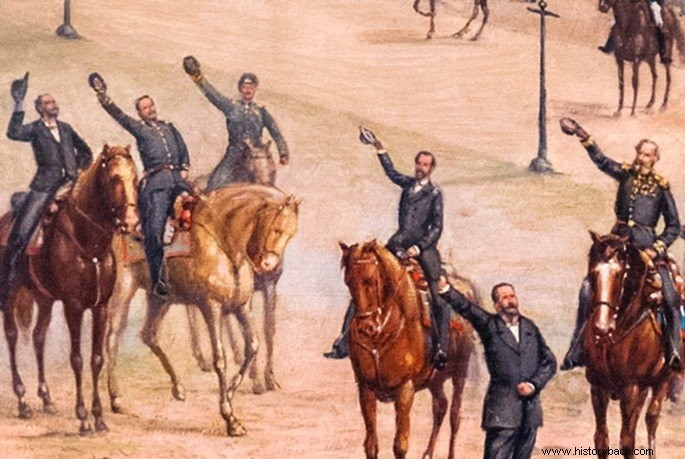The Proclamation of the Republic took place on November 15, 1889.
This day is a holiday, because it celebrates the date on which the republican regime was proclaimed in Brazil. The first president of Brazil was Marechal Deodoro da Fonseca.
With the change from the monarchical to the republican regime, Dom Pedro II was removed as emperor, giving way to the first president of Brazil.
How did the Proclamation of the Republic happen?
The monarchic regime had been going through a series of crises that were difficult to overcome.
First there had been the religious question, when the Emperor objected to a papal bull. The case ended with the arrest of two bishops in an extremely Catholic society.
Then there was the military issue, where the military publicly demonstrated their dissatisfaction with the regime. They wanted more recognition from society and a pay raise.
The army, mainly, was divided into those who supported the Emperor and those who wanted the Republic in order, according to them, to modernize the country.
Finally, the issue of the abolition of slavery meant that the landowners no longer supported the monarchy. The end of slavery without compensation represented a severe economic loss for the landowners.
Thus, in the early hours of November 15, a group of soldiers decided to put an end to the monarchy. Led by Lieutenant Colonel Benjamin Constant and aided by civilian Quintino Bocaiuva, part of the Army decides to act.
For that, they needed a leader who was an experienced soldier. The chosen one was Marshal Deodoro da Fonseca, a veteran of the Paraguayan War appreciated by the troops.
However, Marechal Deodoro was sick and in bed, and he was practically carried off to the Ministry of War. He thought he was overthrowing the Viscount of Ouro Preto's cabinet and not the monarchic regime.

The Imperial Family was in Petrópolis and the Emperor followed the events. On the night of November 15th, the sovereign was officially announced that the republican regime was proclaimed.
To avoid a civil war, Emperor Dom Pedro II decided not to summon any military commander allied to the monarchy.
Taking advantage of the fact that there was no hostile reaction on the part of the Emperor, the military decided to expel the Imperial Family from Brazil. Thus, Dom Pedro II, Empress Teresa Cristina, their children and grandchildren were embarked at dawn on the 17th towards exile.
There was no communication to the population about what was happening. It was not until the following day that the monarch and his family were said to be gone.
Marshal Deodoro would be elected the first president of Brazil and Marshal Floriano Peixoto would be vice president.
Commemoration of the Day of the Proclamation of the Republic
The celebration of the Proclamation of the Republic was always celebrated with great intensity by the republican regime.
The heyday was during the military regime (1964-1985), when large parades were held extolling the figure of soldiers such as Marechal Deodoro, Duque de Caxias, Benjamin Constant, Marechal Floriano, among others.
In the 1980s, elections were always held on November 15th to coincide with the public holiday and civic date.
Anthem of the Proclamation of the Republic
One of the first measures taken by Marechal Deodoro's provisional government was to change the Brazilian anthem and flag.
The flag kept its monarchic colors and forms, and practically only the imperial shield was removed, replacing it with the starry sky and the positivist motto "Order and Progress ".
For the composition of the new hymn, a public competition was opened in January 1890, won by the composer Leopoldo Miguez (1850-1902) and the poet Medeiros e Albuquerque (1867-1934).
However, the military themselves preferred the old tune of the Brazilian National Anthem. Thus, President Deodoro da Fonseca determined that the new composition would be used as an anthem for the Proclamation of the Republic.
Read the lyrics below:
Be an unfolded canopy of light.
Under the wide expanse of these skies
This rebel corner that the past
Come redeem from the most vile labeus!
Be an anthem of glory that speaks
Of hope, of a new future!
With visions of triumphs pack
Who for him fighting arise!
[chorus]
Freedom! Freedom!
Spread your wings over us!
From the fights in the storm
Let us hear your voice!
We don't even believe that slaves once
Have there been in such a noble Country...
Today the crimson flash of dawn
Find brothers, not hostile tyrants.
We're all the same! to the future
We will know, united, to take
Our august banner which, pure,
Shine, onwards, from the Homeland on the altar!
[chorus]
If you need brave breasts
Let there be blood on our banner,
Living blood of the hero Tiradentes
He christened this daring pavilion!
Messengers of peace, peace we want,
Love is our strength and power
But from the war in the supreme trances
Here's to see us fight and win!
[chorus]
From Ipiranga it is necessary that the cry
Be a superb cry of faith!
Brazil has already emerged liberated,
On the royal purples standing.
Hey, Brazilians, onward!
Blonde greens, let's reap the benefits!
May our country be triumphant,
Free land of free brothers!
Fun facts about the Proclamation of the Republic
Recently, historians interpret the 15th of November as a coup d'état, as there was no popular support and the monarchist regime was overthrown by weapons.
The first Constitution of Brazil, of 1891, determined that a referendum would be called so that voters could decide between monarchy and republic. The said referendum only took place 104 years later, in 1993.
Clube de Regatas do Flamengo was founded on November 15, 1895, in Rio de Janeiro, so that this day would always coincide with the holiday of the Republic.
Learn more at :
- Proclamation of the Republic (1889)
- Deodoro da Fonseca
- Anthem of the Proclamation of the Republic
